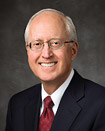Only upon the Principles of Righteousness, by Larry Y. Wilson
Of the Seventy

I like to walk a circle around my yard in the evening to check on our plants and baby trees. When I do this, I'll talk to the trees and the many, many lizards on their branches. This may sound strange, and it probably is, but if anyone sees me, I'm likely covered because I'm usually flanked by one or more of my children and the observer will likely think I'm talking to them instead. (They may wonder if my children's nicknames are little tree, and lizard.)
As I was grooming our orange tree last night, I looked over and saw that my youngest (21-month-old) was swinging from the trapeze of our swing set all by himself. My first thought wasn't, "Oh no, now the neighbors will know that I was talking to the lizards and not my son," but rather surprise that he was tall enough, coordinated enough, and strong to do what he was doing!
 |
| Sorry, I didn't get a picture of the trapeze action; here's one of him running in a grassy field instead. |
When children are small, the little steps of independence are celebrated: standing, walking, feeding oneself, reaching the trapeze, etc. After cheering for my little growing boy, I wondered if my likewise celebrate the steps of independence that my older children show. I concluded too often I scold their acts of independence because theirs frequently seem associated with pushing the limits of family rules or safety standards.
Later on in the evening, I took my four-yr-old to a curriculum night at my eldest's school. On the way, we spoke about how fun it was that he was big enough to stay up to go to this meeting with me. Once in the classroom, I saw some schoolwork my eldest had done, and heard from his teacher how much he is growing and learning.
Naturally, I was torn. On one hand, I was thrilled that he is excelling in a new school year, in a new school, in a new program. On the other hand, I realized that too many of my interactions with him are in a corrective role. I decided that I need to recognize more often his successes, and let him know that I noticed!
I thought of these experiences as I read Elder Wilson's words:
Wise parents must weigh when children are ready to begin exercising their own agency in a particular area of their lives. But if parents hold on to all decision-making power and see it as their “right,” they severely limit the growth and development of their children.
He continued:
Our children are in our homes for a limited time. If we wait until they walk out the door to turn over to them the reins of their moral agency, we have waited too long. They will not suddenly develop the ability to make wise decisions if they have never been free to make any important decisions while in our homes. Such children often either rebel against this compulsion or are crippled by an inability to make any decisions on their own.
My attitude toward my children, unfortunately, varies depending on how I think they're behaving. When they're sweet, it's easy to shower them with praise and love; when they're sour, a resulting shower of criticism and scolding ensues. As I read the second quote (above), I realized that when my children push the limits—in ways that seem to frustrate me to no end—I should be happy that they trust me enough to engage in guided learning at home; they don't simply act one way at home, secretly waiting for the time when they can rebel against everything when parents are away.
After reading this talk, I want to love and trust my children more. I want to help them make decisions now, let them make bigger decisions, and hopefully establish enough trust with them that they will want to talk to me when they're on their own, making even more decisions.
After all, as much fun as it is to talk to trees and lizards, it's much more fun to watch my children succeed and grow!




0 thoughts
Post a Comment